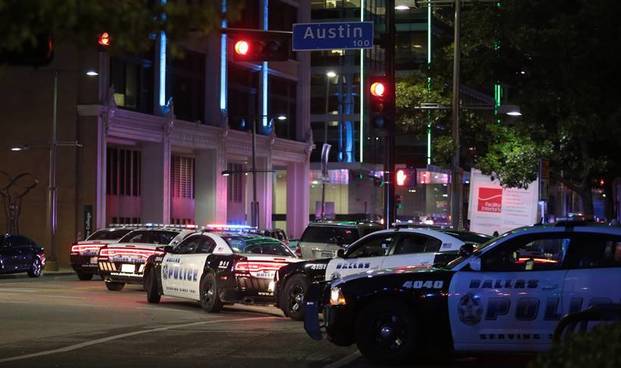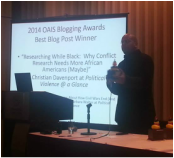And this is where we are. At present, many black urban communities are in the cross-hairs. They are being targeted by violence from the police as well as by other African Americans. In this context, it is ridiculous to assume that blacks will just tolerate this situation, wait for help to show up and not do anything. As a consequence, we see individuals and groups in this community starting to try things.
Many of these tactics will look familiar and will be favorably viewed by those outside of the black community because they draw upon tactics that have been used in the United States for quite some time - what Charles Tilly would call a "repertoire". For example, some will rely upon individuals in the community to help navigate local tensions like the "Interrupters" in Chicago. Some will rely upon local NGOs. Some will rely upon local activists like the locale Black Lives Matter movement. Some will rely on local politicians like the mayor to step up and do something. Some will rely upon legal remedies like lawsuits by the NAACP or ACLU. Some will start talking about black community empowerment through boycotting and developing black economic power like in a bank.
And, some tactics will look unfamiliar and will not especially be favored by individuals outside or inside the community. For example, some want to pick up and some have picked up guns in retaliation and frustration as was done in Dallas. Some want to pick up and have used guns in defense and protection. The latter approach was not only advocated by individuals such as Malcolm X and Robert F. Williams but it was also advocated by different political organizations (e.g., the Deacons for self defense, The Revolutionary Action Movement, the Black Panther Party for Self Defense and the Republic of New Africa).
Of course, this is not all that we are going to see. I'm sure that there are going to be town hall meetings, sit ins, teach ins, walk outs, petitions, lectures, commissions, hearings, concerts, conferences, grant competitions, tv specials, calls for black private security firms, calls for personal responsibility and other activities.
But regardless of what we see people try, if the American repertoire of solutions that step outside of mainstream politics holds true, people will want to think that America can talk its way out of the current problem. There is a faith in deliberation that exists.
With this in mind, though, I want to remind folks about an earlier effort toward this end. Remember President Bill Clinton's national conversation on race? This had the approval of the president, a prestigious national panel as well as the buy in from locale leaders and for all intents and purposes, it was a miserable failure.
At the time, a group convened in different cities around the us, they talked about national as well as some locale trends in racism/discrimination and then they opened up to the locale community. This is where things got interesting because invariably people had much more to say than the panel had time for. In Denver (where I was at the time) I remember the ridiculousness of trying to get some seventy year old African American man asked about racism to rap it up in a few minutes. There was no way that this was going to work. He had so much he wanted to share but the structure of the event did not facilitate this.
Now, It's not as if Americans are not ready for such conversations and there aren't some people out there with the time, heart and interest for such a thing. I participated in a year-long meeting on racial harmony that convened once a month while in Houston, Texas in 1990s that was one of the best experiences of my life.
The initial group was brought together by some artists who each put forward pieces that addressed the topic. Each artist went around the room at the opening to talk about what they had in mind. I was there representing my mother who submitted a piece where some whites were painting Jesus white. After the individual presentations, we had a relatively open discussion about race relations in america for several hours.
This time was filled with questions, emotions, half-truths and curiosity but overall there was a desire to understand. Things got heated at times that day but this is just where we were and, I think, this is where we had to go. This was not uniform - some whites as well as whites did not see the point of a conversation and they left before the meeting ended.
At the end of the day about 10 of us wanted to continue to have the conversation. Month after month we returned for our sessions (6-8 hours on a Sunday). Month after month new people would show up, vent and walk away or someone would show up and want to see what we were going to do. Once it was clear that we were not going to do anything "outside of that room", they would leave.
But, we did do something outside of that room and in my mind this legitimated the whole effort. I met and interacted with what became two of my best friends on the planet and their children, extended family and friends. They entered my life and I entered theirs and my existence was improved from the exchange.
Now, I'm not saying that someone should go pick up a conversation as opposed to picking up a gun or a lawsuit or a sit in. Most do not want to put in the time for such a thing. We also don't really know what has an impact on making individuals aware about anti-black violence nor what decreases it but this is what we have to investigate. But we can start thinking about what to do.
Perhaps we need "black-watch" committees in each city that can develop appropriate research designs, collect data, facilitate analyses as well as conversations. While we are going to gravitate to our preferred tactic/resolution, let us remember that just because we like a tactic does not mean that it is the best for the specific topic of interest nor does it mean that all others will likely gravitate to it as well.
Perhaps we need each city in America to explore its specific version of the color line - something less official than the president's effort but deeper and more consistent. We meet to talk all the time - in classes, places of worship, chat rooms. What if we had the conversation about what is going on, why it's going on and what should take place to change it? What if we made the answers to these questions available? What if foundations offered a reward for coming up with resolutions? What if we had 300 million conversations that became one?
Perhaps we need to have a moratorium on diverse aspects of the criminal justice system that are being questioned - patrolling, patrolling with weapons, stopping drivers/walkers, arresting, sentencing and parole evaluations. Perhaps it all needs to be halted and systematically evaluated, so we can have a real conversation as well as some guided change.
But before we can get here, if we are to find our way as a collectivity, perhaps we will need tolerance for everything as we find that way. Am I saying that we tolerate and excuse violence? Well, no because no more human lives should be lost to violence. At the same time, we have to acknowledge that the country as a whole has generally been tolerating violence for quite some time. Americans have largely tolerated, ignored and occasionally excused anti-black violence. This community has been killed off - systematically and purposively - for quite some time. This community is also dying off as black mortality rates relative to whites are not comparable. I do not want to get into a these people have suffered more than these other people type of discussion at this point (although one is overdue), but at a minimum we should be able to agree that there has been violence directed against as well as within the black community and over several hundred years. Much of it has taken place without any or much discussion but that is not where we are now. Today is when we start to catalog, discuss and analyze all of it. Perhaps the beginning of this conversation is taking it all in, understanding everything that is being done on all sides and trying to understand why actions have been taken.


 RSS Feed
RSS Feed
